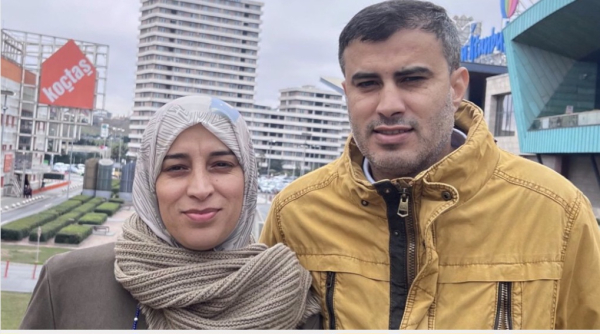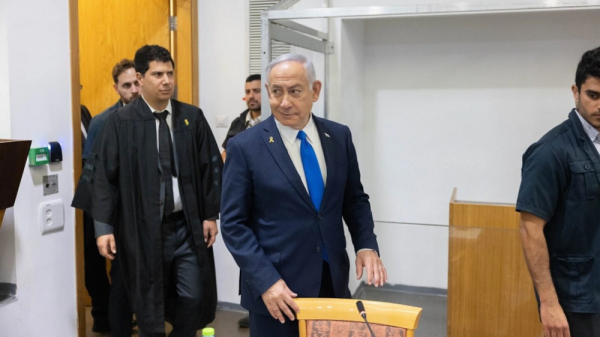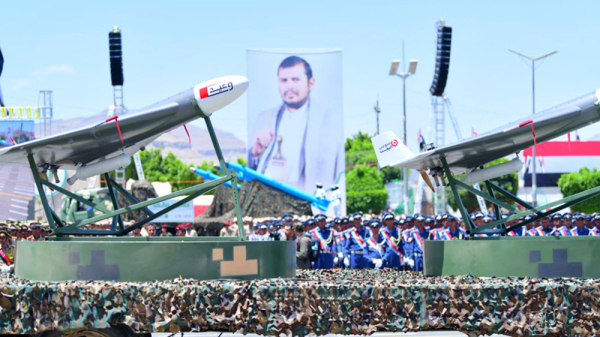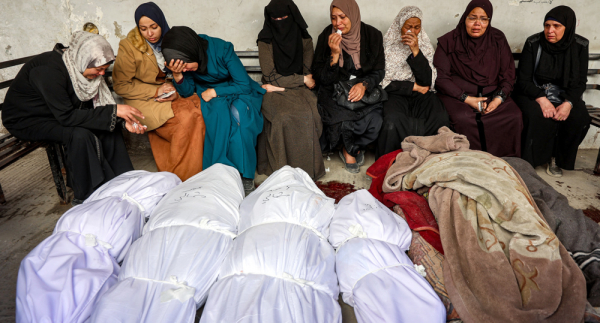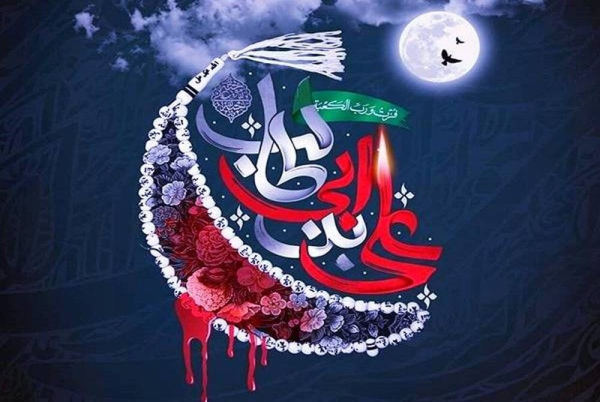zarezadeh
The Martyrdom of Imam Ali (AS)
After the Khawarij defeated the army of Imam Ali (AS) in the Battle of Nahrawan, a group of three of them decided to assassinate Muawiyah, Amr Al-As, and Amir al-Mu'minin Ali (AS) simultaneously, in order to eliminate, in their opinion, the three factors of discord and sedition among the Muslims. Ibn Muljam Muradi was ordered to kill the Imam (AS) and carried out his decision with the help of Wardan bin Mujalid, Ash'ath bin Qais, and Shabib bin Bajra, who was a Khawarij member of Nahrawan. On the morning of Wednesday, the 19th of the holy month of Ramadan, 40 AH, Ibn Muljam stabbed the Imam (AS) with a poisoned sword while he was praying in the mihrab of the Kufa Mosque. Imam Ali (AS) was martyred on the night of the 21st of Ramadan as a result of this blow.
Birth and Lineage of Imam Ali (a.s.)
Ali ibn Abi Talib (a.s.) was born in the Kaaba on Friday, the 13th of Rajab, in the year of the Elephant (10 years before the Prophethood). His father was Abu Talib, the uncle of the Messenger of God (a.s.) and his mother was Fatimah bint Asad, both of whom were from the Banu Hashim clan of the Quraysh tribe in Mecca.
When Imam Ali (a.s.) was born, his mother Fatimah bint Asad named him “Haydra” (meaning lion). Then she and Abu Talib agreed by divine inspiration to name him “Ali”.
Fatimah bint Asad says: “I entered the Sacred House of Allah and ate from the fruits of Paradise and its provisions, so when I wanted to go out, I cried out without a sound: O Fatimah! I named him Ali, for he is Ali, and Allah, the Most High, says: “I have separated his name from My name, and I have educated him with My education, and I have established him on a mysterious knowledge, and he is the one who breaks the idols in My house, and he is the one who calls the call to prayer above the roof of My house, and he sanctifies Me and glorifies Me, so blessed is he who loves and obeys Him, and woe to him who disobeys and hates Him.”; “I entered the Kaaba and ate from the fruits and provisions of Paradise. So when I wanted to come out, someone called me: O Fatima! Name him Ali, for he is Ali (high in rank), and Allah, the Most High, says: I have taken his name from My name, and I have educated him with My education, and I have made him aware of the difficulties of My knowledge. He is the one who breaks the idols in My house, and he is the one who calls the call to prayer above the roof of My house, and he sanctifies and glorifies Me. So blessed is he who loves and obeys Him, and woe to him who disobeys and hates Him.” So, blessed is the one who loves him and obeys him, and woe to the one who disobeys him and makes him his enemy!
Imam Ali (AS)
Ali ibn Abi Talib (AS), nicknamed Amir al-Mu'minin, is the first Imam of the Shiites, the cousin and son-in-law of the Prophet Muhammad (PBUH), the husband of Hazrat Zahra (AS), and the father of Imam Hassan and Imam Hussein (AS). He was the first man to believe in the Prophet of Islam and was specifically given the title Amir al-Mu'minin by the Prophet. The Prophet appointed Hazrat Ali as his successor at Ghadir Khum by God's command and took the oath of allegiance from the people. However, after the Prophet's death in the year 11 AH, some of the Muhajirin and Ansar disobeyed this order and arbitrarily swore allegiance to Abu Bakr as the caliph of the Muslims in the Saqifa of Bani Sa'ida! This event led to the fact that the Prophet effectively became the caliph in the year 35 AH, after Uthman. His reign was generally marked by conflict with Muawiyah, the followers of Jamal, and the Khawarij, and he was finally martyred in 40 AH at the age of 63 by a Khawarij named Ibn Muljam Muradi. The issue of the caliphate of Imam Ali (a.s.) is an issue that divides Muslims into two groups: Shiites and Sunnis; Shiites consider him the immediate successor of the Prophet (pbuh) and Sunnis consider him the fourth caliph.
Israel ‘killed my heart’: Entire family of Geneva-based rights monitor chief’s sister massacred
Israeli forces have killed the sister of the head of a prominent Geneva-based human rights monitor, along with her entire family, in the Gaza Strip, during, what has been denounced as, the regime’s overturning its ceasefire agreement with Gaza’s Hamas resistance movement.
Rami Abdu, chairman and founder of the Euro-Mediterranean Human Rights Monitor, announced the tragedy in a post on X on Tuesday.
He referred to her sister, Nasreen, as his “heart,” saying she had been killed earlier in the day.
The attack also claimed the lives of Nesreen’s children, Ubaida, Omar, and Lian, as well as Ubaida’s wife, Malak, and their two children, Siwar and Mohammed, the post added.
“Parting is painful, but it is God’s will,” Abdu regretted.
The massacre came amid Euro-Med’s ongoing revelations of the Israeli regime’s deadly and devastating violations against Palestinians.
It also took place after the Israeli military heavily intensified its aerial assaults across Gaza’s entire expanse, killing more than 300 Palestinians, mostly women and children, in just 24 hours.
The ceasefire took effect in January in the hope of ending the regime’s 15-month-plus war of genocide against Gaza that began after Hamas and its fellow resistance groups from the Palestinian territory launched a historic operation against the occupied Palestinian territories.
More than 48,000 Palestinians have perished during the genocide in addition to hundreds more who have been killed as a result of the Israeli violations of the deal.
Also on Tuesday, the White House announced that the Israeli regime had consulted with US President Donald Trump's administration before launching its overnight wave of strikes in Gaza.
Condemning the bloodletting, Hamas voiced reprehension over Israeli prime minister Benjamin Netanyahu and his “Nazi” administration’s resuming their aggression and genocidal war against defenseless civilians in the Gaza Strip.
The regime, the group lamented, had decided to “overturn the ceasefire.”
Press TV’s website
Entire families wiped out as Israel bombs Gaza’s residential areas
Palestinians in Gaza were woken up by Israel unleashing a new wave of attacks on Gaza which killed at least 404 people and wounded 562.
The attacks on Tuesday not only shattered a period of relative calm in Gaza during the Muslim holy month of Ramadan but also the fragile ceasefire deal Israel had with Hamas.
Palestinians who had returned to their damaged and destroyed homes after the ceasefire came into effect were also targeted by Israel’s relentless bombing as entire families were wiped out in seconds.
Aljazeera
Netanyahu’s testimony in corruption trial cancelled amid renewed Gaza genocide
The Israeli prime minister’s testimony in a corruption trial has been canceled due to “security developments,” following the renewed attacks on Gaza which have so far killed hundreds of people, including many children.
According to the Hebrew-language Maariv daily newspaper, Benjamin Netanyahu had asked for his testimony on Tuesday to be cancelled, hours after the 75-year-old chairman of Likud right-wing political party oversaw the heavy bombardment of the besieged Palestinian coastal territory.
Netanyahu is facing charges of bribery, fraud and breach of trust. He appeared before the court on Monday in one of three long-delayed cases that he has described as a political “witch-hunt.”
Netanyahu's trial began on May 24, 2020. Under Israeli law, he is not required to resign unless convicted by the so-called Supreme Court, a process that could take several months.
Opposition leaders accuse Netanyahu of escalating the Gaza war to evade his trial, and achieve a victory that could protect him from conviction and keep him in power.
The Democrats party leader Yair Golan said the prime minister resumed the war in Gaza for political survival, arguing that soldiers and captives are “just cards in his game of survival.”
“Netanyahu is using the lives of our citizens and soldiers because he trembles in fear of us — the public protest against the dismissal of the head of the Shin Bet,” the left-wing leader said in reference to Netanyahu’s recent decision to fire Ronen Bar, the director of the regime's so-called internal security service – known as Shin Bet.
Israelis “must not let the madness win” and instead protest in order to save Israel “from the hands of this corrupt and dangerous man,” he said as he called for mass rallies.
More than 350 Palestinians, mostly children and women, have been killed in Israeli air attacks on Gaza that started at approximately 2:30 a.m. local time (0020 GMT) on Tuesday, shattering the ceasefire agreement with the Palestinian Hamas resistance movement.
Netanyahu’s office said the fresh onslaught was in response to Hamas’s “repeated refusal” to release remaining captives in Gaza, and the group’s failure to agree on ceasefire proposals from US presidential envoy Steve Witkoff and other mediators.
In return, Hamas blasted “Netanyahu and his extremist administration” for overturning the January 19 ceasefire and “exposing prisoners in Gaza to an unknown fate.”
The resistance group also called for the “free people of the world” to protest the devastating attacks on the Palestinian territory.
Press TV’s website
Yemen says ‘fully ready’ for ‘long naval battles with new methods to stun enemies’
Yemen's defense minister has pledged the country’s full combat readiness to retaliate against enemies’ acts of provocation and aggression in kind, warning that the nation’s Armed Forces were set to engage in drawn-out naval confrontations with the adversaries in the same context.
Major General Mohammed Nasser al-Atifi made the remarks as tensions are running high between Yemen and the United States after US President Donald trump ordered deadly airstrikes across Yemen on Sunday night.
The raids were launched hours after the Ansarullah resistance movement warned that the Yemeni Armed Forces would target the American aircraft carrier, and warships in the region.
Yemen asserts that it will continue its pro-Palestinian operations against sensitive and strategic targets across the occupied territories and the Israeli ships crossing key waterways.
"Yemen has already issued public warnings that it will not be forced to remain silent about the Zionist aggression in its brutality, starvation, and unjust siege of the Palestinians in Gaza, and that it will meet the siege with a siege and escalation with escalation,” Atifi noted.
He reiterated that. "If the Zionist enemy does lift its siege on Gaza people, the Yemenis armed forces are ready to develop the confrontation in proportion to the size of the challenge and any emergency situation."
Atifi reaffirmed Yemen's unwavering support for Gaza, stating that the nation would continue its efforts until justice was achieved for Palestinians and their suffering ended.
Yemen had stopped its pro-Palestinian strikes after the ceasefire took effect in January. It, however, resumed the operations targeting Israeli ships after the Israeli regime failed to heed a deadline by Sana’a to lift the siege and let aid reach the Palestinian territory.
Al-Atifi emphasized that Yemen's military capabilities, including missile forces, drones, and naval units, were at peak readiness to undertake missions in defense of Arab and Islamic nations.
The Yemeni defense minister highlighted that all necessary military measures had been implemented following the expiration of the deadline for removal of the siege.
Atifi was referring to the United States and the UK, which had resorted to heavy offensive naval buildup off Yemen’s coastline, and had escalated its attacks on the Arab Peninsula country to try to stop its pro-Palestinian strikes.
Sana’a has been responding to the intensified attacks by targeting American warships, and enhancing its preparedness to take on the naval assets.
The Yemeni official, however, clarified that Yemen's decision to prevent Israeli ships from navigating the Red Sea, the Bab el-Mandeb Strait, the Gulf of Aden, and the Arabian Sea did not threaten international maritime navigation in those areas.
Press TV’s website
Condemnations pour in after Israel unleashes deadliest Gaza strikes since ceasefire agreement
Overnight Israeli airstrikes on the Gaza Strip, which were the deadliest since a ceasefire began in the besieged territory, have drawn a wave of condemnations worldwide.
Over 410 Palestinians, including women and children, were killed on Tuesday after the occupying regime resumed its genocidal war on Gaza, undermining the fragile two-month-long truce agreement with the Hamas resistance group.
China's Foreign Ministry spokeswoman Mao Ning said Beijing was "highly concerned about the current situation between Israel and Palestine."
She also called for the parties to "avoid any actions that could lead to an escalation of the situation, and prevent a larger-scale humanitarian disaster."
'Spiral of escalation'
Russia also warned of a potential “spiral of escalation” in Gaza amid renewed Israeli genocidal attacks.
“The latest aggravation of the situation, the return to a spiral of escalating tensions, this is what worries us,” Kremlin spokesman Dmitry Peskov said.
He said Moscow is monitoring the situation very closely and expects it to return to a “peaceful course.”
Meanwhile, Australian Prime Minister Anthony Albanese urged respect for the ceasefire in Gaza, where "there’s already been enormous suffering."
He also said that his country will continue to stand up for peace and security in the region.
Israel launched its brutal Gaza onslaught on October 7, 2023, but the regime failed to achieve its declared objectives despite killing more than 48,000 Palestinians, mostly women and children.
The Tel Aviv regime accepted Hamas’s longstanding negotiation terms under the three-phase Gaza truce, which began on January 19.
Later, however, Israel refused to move forward to the second stage of the ceasefire, which required it to withdraw the occupation troops from Gaza.
Press TV’s website
The plot to kill the Imam by the Khawarij
During the short period of Imam Ali's (a.s.) rule, three major civil wars took place: Jamal, Siffin, and Nahrawan. In the battle of Nahrawan, when Imam Ali's supporters defeated the Khawarij, their survivors gathered in Mecca for a while and mourned the killing of Nahrawan.
In one of these meetings, they decided to kill Imam Ali (a.s.), Muawiyah, and Amr ibn al-Aas. Ibn Muljam al-Muradi accepted the killing of the Commander of the Faithful, Hajjaj ibn Abdullah, known as Barak, took the killing of Muawiyah, and Amr ibn Bakr al-Tamimi took the killing of Amr ibn al-Aas.
All three decided to carry out their decision on the night of the nineteenth of Ramadan during the morning prayer. Therefore, Ibn Muljam set out for Kufa to kill Imam Ali.
Ibn Muljam came to Kufa, but hid his intention and stayed in the Bani Kanda neighborhood, where he lived among the Khawarij, until the promised day.
At this time, he met Qattam, the daughter of Akhdar Taymiyyah, fell in love with her, and proposed to her. Qattam, whose relatives were killed in the war with the Imam, held a grudge against the Imam and stipulated that she would marry Ibn Muljam only if he killed Imam Ali.
Ibn Muljam revealed the secret of his presence in Kufa when Qattam shared his opinion in his enmity with the Imam. To help Ibn Muljam, Qattam called Wardan ibn Mujalid and Shabib ibn Bajrah, and they accepted. (Al-Irshad, Al-Mufid, Vol. 1, p. 17)
After learning of Ibn Muljam's intention, Ash'ath ibn Qais also promised to accompany him, and thus the four conspirators gathered in the mosque of Kufa at dawn on the 19th of the blessed month of Ramadan to martyr the Imam.
The Night of Imam Ali's (a.s.) Slaughter
The Night of Imam Ali's (a.s.) Slaughter refers to the night of the 19th of Ramadan, when Imam Ali (a.s.) was wounded with a sword blow at dawn in the year 40 AH. This incident occurred in the Kufa Mosque by Ibn Muljam Muradi and led to the martyrdom of Imam Ali (a.s.) on the 21st of Ramadan.



